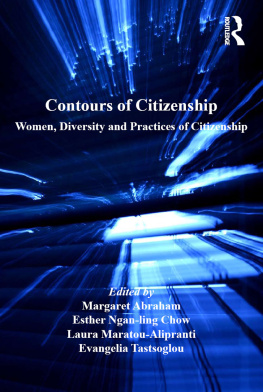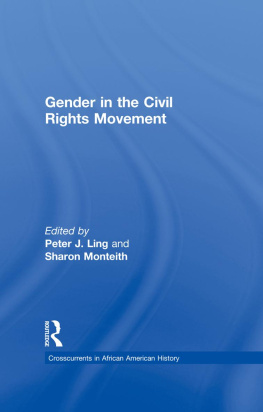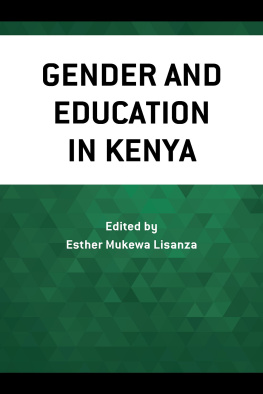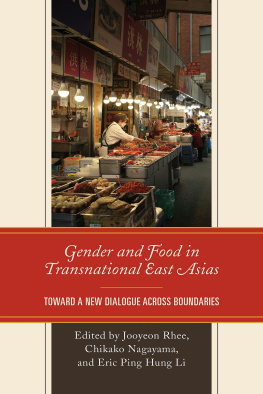Transforming Gender and Development in East Asia
Transforming Gender and Development in East Asia
Edited by
Esther Ngan-ling Chow
Published in 2002 by
Routledge
711 Third Avenue
New York, NY 10017
Published in Great Britain by
Routledge
2 Park Square, Milton Park
Abingdon, Oxon 0X14 4RN
Routledge is an imprint of the Taylor & Francis Group, an informa business
Copyright 2002 by Routledge
Design and typography: Jack Donner
All rights reserved. No part of this book may be reprinted or reproduced or utilized in any form or by any electronic, mechanical, or other means, now known or hereafter invented, including photocopying and recording or in any information storage or retrieval system without permission in writing from the publisher.
Library of Congress Cataloging-in-Publication Data
Transforming gender and development in East Asia / edited by Esther Ngan-ling Chow,
p. cm.
Includes bibliographical references and index.
ISBN 0-415-92491-X ISBN 0-415-92492-8 (pbk.)
1. Women in developmentEast Asia. 2. Sex roleEconomic aspectsEast Asia. 3. East Asia Economic conditions. I. Chow, Esther Ngan-ling, 1943
HQ1240.5.E18T73 2002
305.42095dc21
2001057862
With immense indebtedness
to my grandmother,
my mother,
and women factory workers in East Asia.
There are four reasons I am compelled to work on this book. The first is to open a critically intellectual space by incorporating gender perspectives in the study of East Asian development in its global context. I intend the book to fill a major knowledge gap and to move womens and gender issues in the development studies in this region into the mainstream. In recent years voluminous literature has found competing explanations as to why and how East Asian economies succeed, particularly in the cases of the economic miracles experienced by Japan, the four Asian Dragonsnamely Hong Kong, Singapore, South Korea, and Taiwan and more recently China. Undoubtedly, many thoughtful analyses have advanced our knowledge of the development process in East Asia. However, the prevailing scholarly work in this area is, for the most part, gender-neutral or gender-blind. What is largely omitted is a gender perspective from which researchers and scholars engage in development research and analysis. This omission is surely a serious one since it not only stifles a full intellectual understanding of the very phenomenon of development, which we try so hard to comprehend, but also may misguide development policies and practices. Hence, this book seeks to affirm the value of gender studies, not merely as an alternative vision and analysis, but as a starting point to explore a competing paradigm that parallels and challenges mainstream development thinking.
My profound interest in transforming the consciousness and experiences of women workers into social fact through a text of diverse situated knowledge, both intellectual and illuminating, is the second reason for working on this volume. I firmly believe that such knowledge should be located from the ground up, reflecting everyday lived experiences and standpoints of diverse kinds of women and men. Feminist and Global South scholars with perspectives ranging from liberal to radical and ecofeminist traditions have addressed the androcentric, ethnocentric, and exclusive nature of knowledge in development literature and practices. Their scholarship places socially and differentially situated women, their vantage points, experiences, and realities vis--vis mens in the center of a relational, comparative, and historical analysis. This feminist thinking infused with the knowledge of development is not essentially reductionist. It articulates the social embeddedness of gender, not only in power relationships but also in structure, culture, and the process of society. It is intricately linked to the dynamism of macro social forces at work determining normative rules, ideologies, and institutional arrangements and structuring the social locations of people that further shape their identity, subjectivity, behavior, and even resistance.
Related to this is the third reason, which is to give voice. To speak out as a subaltern other, as Gayatri Spivak has framed it and to encourage workers, especially women, to do so has become my life project so as to dismantle an existence of voicelessness, facelessness, invisibility, and powerlessness. Though my job as a factory worker was brief and seasonal, I witnessed the industrialization of Hong Kong in the 1950s. The indigenous voices of manufacturing laborers as a class, as a group of women, and as subaltern others transformed my being and thinking as a person early on and, ultimately, as a scholar. This underlying motivation has inspired me to do research and promote indigenous scholarship in the field of gender and development to place women at the center, leading me to this anthology. In this volume, many scholars have joined me in an effort to give voice and to develop indigenous situated knowledge from the ground up. I hope that our research and scholarship will help lay an epistemological foundation for future theoretical explorations in gender and development in East Asia specifically and in other parts of the world globally.
The final reason is to underscore an important relationship between knowledge and power, seeing knowledge itself and its process as liberatory and leading to self and collective empowerment. Working on this volume is empowering for those, including myself, who engage in the process of knowledge production, for those who are being studied, and for those who potentially benefit from it. Studies included in this volume have only just begun to lay the groundwork, directly or indirectly, that links theoretical analysis to development policies, programs, and practices in East Asia. This volume serves as an invitation to concerned others to join forces to further the transformation of situated knowledge into liberatory knowledge and the translation of self empowerment into collective empowerment for promotion of global justice, effective social change in society, and for the well-being of its people.
Esther Ngan-ling Chow
In working on this book, I have incurred intellectual and personal debts to numerous individuals. Special thanks are given to the contributors of this volume, most of them indigenous scholars and researchers, who have worked diligently and rigorously and with professionalism on each of their book chapters, writing draft after draft to polish their analyses. I would first like to thank Catherine Tang, the Director of Gender Research Programme, who invited me to be a speaker at the International Conference on Gender and Development in Asia held at the Chinese University of Hong Kong at the end of 1997. It was from this conference that two-thirds of the chapters for this volume were obtained. I am indebted to Ching Kwan Lee the most for her tremendous help working with me to formulate the basic ideas of the book proposal. Her thoughtfulness in offering two rounds of chapter reviews provided much needed constructive, yet critical, suggestions and comments to me as well as to the authors. She was also instrumental in obtaining the initial research fund for this project from the Chinese University of Hong Kong.
During the book project, I received much collegial support, encouragement, and advice from Myra Marx Ferree, Judith Lorber, Catherine White Berheide, Marcia Texler Segal, Carla Howery, and Mary Frank Fox. Joan Acker and Patricia Yancey Martin generously shared with me reference information on gendered organizations. Xiaolan Bao, Wu Xu, Nai-hua Zhang, and Christina Gilmartin from the Chinese Womens Studies Society buttressed me with spirited support that energized me when I needed it. Standing by me at American University are Ken Kusterer, Bette Dickerson, and Jenny Verdaguer, who offered office support and consultation, both personal and professional. For years, Ken Kusterer has shared much of his deep sense of knowledge of and experience in the development process in the Third World. He, along with Christine E. Bose, the current editor of








